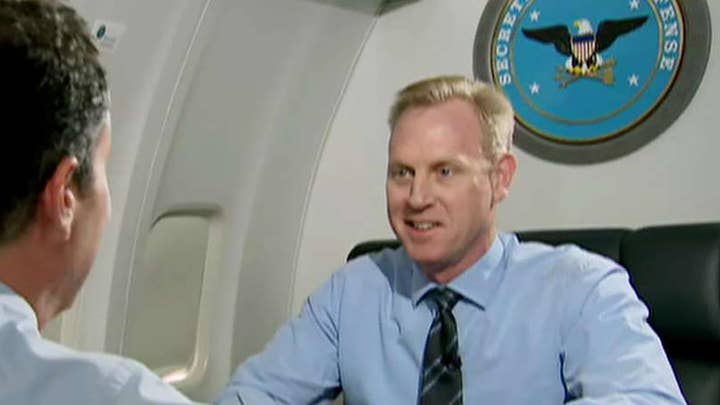Who is Patrick Shanahan?
Retired U.S. Air Force Lt. Gen. Richard Newton says Secretary of Defense Patrick Shanahan will support President Trump's agenda to secure the southern border.
It’s not often that the right person comes along at the right time, especially for a position of awesome responsibility like Secretary of Defense. But President Trump’s choice of Patrick Shanahan for that post is a happy marriage of man and circumstance, and America will be stronger and safer as a result.
Shanahan has been Acting Secretary of Defense since General James Mattis' retirement in February. The former Boeing executive will be facing confirmation hearings in Senate next month, to make that appointment permanent. Some will wonder why at a time of rising tensions with Iran and China’s growing militarism in the South China Sea and elsewhere, we need a business executive at the helm of America’s armed forces and whether we shouldn’t find another experienced warfighter to succeed Jim Mattis.
The truth is, we need a Secretary of Defense who understands that his first responsibility will be getting the Pentagon and America ready for the coming era of high-tech warfare in the 21st century. Increasingly the business of the Pentagon will be the business of building and dominating the high-tech frontier on which the future defense of America will rely, from artificial intelligence and unmanned drones to lasers and quantum technology.
PATRICK SHANAHAN: PRESIDENT TRUMP GAVE 'DIRECT LEGAL ORDER' FOR MILITARY TO SECURE BORDER
That means building new relationships between the Pentagon and the most innovative high-tech companies from Google and Apple to brand new start-ups, so our defenders can capture the fleeting opportunities offered by this fast-moving economic sector. By background and instinct, Patrick Shanahan is the perfect man to grasp this opportunity.
A graduate of the University of Washington and MIT, Shanahan joined Boeing in 1986. He worked on advanced rotocopter systems like the V-22 Osprey and Apache helicopter, and then was general manager of Boeing’s Missile Defense Systems, including its laser programs, and oversaw Boeing’s supply chain and manufacturing operations. By 2007 he was already known at Boeing as “Mr. Fix-It” – a good omen for the man whom Trump tapped to be Acting SecDef in 2017, and now for the permanent post.
Business execs have run the Pentagon before, but none have had the range of experience and expertise in defense tech that Shanahan brings. He’ll be comfortable talking about advanced lasers and AI and robotics and autonomous systems and will be able to contact the people who understand and work on these technologies at the touch of a phone pad.
He won’t be put off by Silicon Valley’s innovative culture, which will be crucial for reshaping the Pentagon for the high-tech future. At the same time, he’ll have the skills to get those companies focused on national security, not just market share; and get them to understand what warfighters will need not just today, but two or three decades from now.
Alan Mulally, the former CEO of Ford Motor Company, has said that Shanahan's can-do attitude and his ability to get everyone on the same page, is impressive. "He really believes in talented people working together,” Mulally told an interviewer earlier this year, “meaning everybody knows what the plan is; they know what the status is; and they're all committed” to achieving a common goal: which now must be making sure America has a military second to none, today and in the future.
Shanahan will also have to use his office to alert the public to the full extent of China’s threat to America, which reaches far beyond conventional military threats like submarines and missiles and Stealth aircraft. Increasingly it revolves around the struggle for high-tech supremacy from AI and quantum to the current clash with China and Huawei over the future of 5G advanced wireless – the struggle that will determine who dominates, and who’s dominated, in the 21st century.
Above all, Shanahan will understand that in order to get America ready to defend itself in the 21st century, he’ll need to get the most out of every Pentagon dollar. With a budget squeezed by the rising cost of benefits and health care for our service personnel, and at a time when our existing defense industrial base will need help facing serious shortfalls, it won’t be possible to throw tens of billions at the new technologies that will enable us to maintain edge over China and Russia.
CLICK HERE TO GET THE FOX NEWS APP
Instead, Shanahan will need to develop effective ways to identify, adapt, and render operational key technologies emerging from the private sector, from AI and quantum technology to robotics and additive manufacturing, and adapt them to the needs of our warfighters and defense strategy.
In any case, we’re on the brink of a new era for America’s defense posture, and our defense cooperation with allies from NATO to Japan and Israel. By appointing Patrick Shanahan as the next Secretary of Defense, President Trump is making sure we take the right path to that new era-and to America’s security far into the future.


